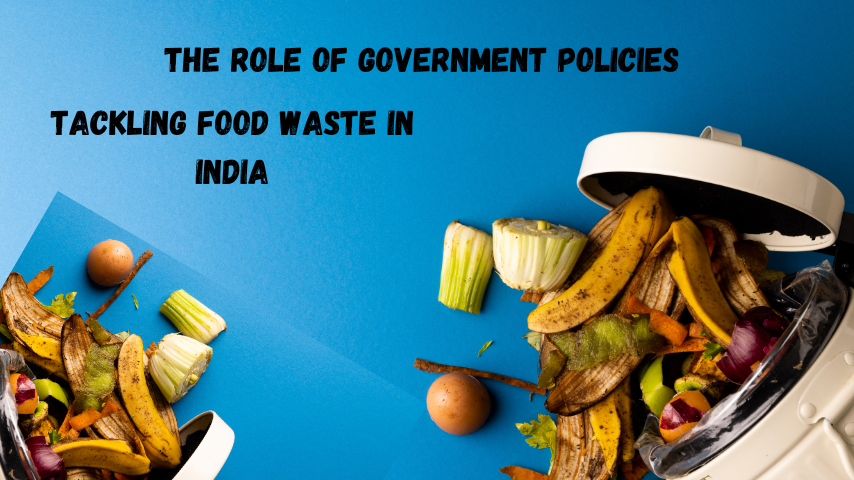“Wasting food is not just an economic loss; it is a loss of precious resources and a missed opportunity to nourish those in need.”
Food waste is a significant challenge in India, impacting both the environment and food security. As one of the world’s largest agricultural producers, the country faces the paradox of millions of people going hungry while substantial amounts of food are wasted each year. This problem not only represents a loss of valuable resources but also contributes to environmental degradation and missed opportunities to address hunger and malnutrition. Effective food waste management and the promotion of sustainable practices are crucial to tackling these issues and ensuring that food reaches those who need it most.
10 Key Aspects to Understand the Food Waste in India
1.The magnitude of the Problem:
Food waste is a massive issue globally and is particularly acute in India, where millions of tons of food are wasted annually despite a significant portion of the population facing food insecurity.
2.Environmental Impact:
Wasting food contributes to environmental problems, including the unnecessary use of water, energy, and other resources required to produce, process, transport, and dispose of food. Food waste in landfills also generates methane, a potent greenhouse gas that contributes to climate change.
3.Economic Loss:
Food waste represents a substantial financial loss, both for individual households and the economy as a whole. The resources invested in food production, such as labor, water, fertilizers, and energy, are wasted when food is discarded.
4.Food Supply Chain Inefficiencies:
A significant portion of food waste occurs due to inefficiencies in the food supply chain, including inadequate storage facilities, transportation issues, improper handling, and lack of cold chain infrastructure.
5.Post-Harvest Losses:
In India, a large amount of food waste happens at the post-harvest stage, where lack of proper storage, pest infestation, and inadequate infrastructure result in significant losses of perishable goods like fruits, vegetables, and grains.
6.Consumer Behavior:
At the consumer level, food waste often results from purchasing more food than needed, poor meal planning, and improper storage. Lack of awareness about food labeling and expiration dates also contributes to unnecessary waste.
7.Social and Ethical Concerns:
Wasting food raises ethical concerns, especially in a country like India, where food insecurity and malnutrition remain significant issues. Reducing food waste is not only an economic and environmental necessity but also a social and moral imperative.
8.Role of Technology and Innovation:
Advances in technology, such as improved storage solutions, better inventory management systems, and apps for connecting surplus food with those in need, play a crucial role in reducing food waste.
9.Zero Waste Initiatives:
The rise of zero waste shops and initiatives is a growing trend aimed at minimizing food waste by encouraging consumers to buy only what they need, reduce packaging waste, and promote a more sustainable approach to consumption.
10.Need for Comprehensive Solutions:
Addressing food waste requires a comprehensive approach that includes policy interventions, consumer education, technological innovations, and better supply chain management to ensure that food is utilized efficiently and sustainably.
9 Key Government Strategies to Combat Food Waste in India
As discussed, Food waste in India is a critical issue, with far-reaching consequences for the environment, economy, and food security. To tackle this challenge, the Government of India has implemented a range of policies and initiatives aimed at minimizing food waste across the supply chain. These efforts focus on everything from promoting sustainable agricultural practices to improving urban waste management systems.
Below is a list of 9 key government strategies that are helping to reduce food waste and promote sustainable practices throughout the country.
1.National Food Security Act and Food Distribution Systems
The National Food Security Act (NFSA), enacted in 2013, is one of the critical policies aimed at ensuring food security and minimizing food waste. By providing subsidized food grains to nearly two-thirds of India’s population, the NFSA helps reduce waste by redistributing food grains that might otherwise go to waste. Additionally, the government’s Public Distribution System (PDS) plays a vital role in minimizing wasting food by ensuring that surplus food is distributed to the most vulnerable sections of society.
2.Promotion of Food Processing and Preservation
To combat food waste, the Indian government has been actively promoting the food processing industry. Through schemes like the Pradhan Mantri Kisan SAMPADA Yojana (PMKSY), the government aims to create modern infrastructure for food processing, reduce post-harvest losses, and increase the shelf life of perishable foods. By enhancing the food and waste handling capabilities, these initiatives encourage farmers and businesses to invest in technologies that help preserve food and reduce waste.
3.Food Waste Management in Urban Areas
Urban areas in India contribute significantly to food waste problems due to inadequate infrastructure and lack of awareness. The Swachh Bharat Mission (Urban), launched in 2014, includes a focus on solid waste management, including food waste recycling. Municipalities are encouraged to implement efficient waste management systems, promote composting, and separate organic waste from other types of garbage. This approach not only helps reduce food waste but also supports the creation of organic fertilizers, promoting sustainable agriculture.
4.Encouraging Sustainable Agricultural Practices
The government has been promoting sustainable agricultural practices to minimize food loss at the production stage. Programs such as the National Mission on Sustainable Agriculture(NMSA) and Pradhan Mantri Krishi Sinchai Yojana (PMKSY) encourage farmers to adopt modern farming techniques, improve irrigation efficiency, and enhance crop storage facilities. These efforts are crucial in reducing food losses caused by inadequate storage and post-harvest management, directly impacting the nation’s ability to reduce food waste.
5.Awareness Campaigns and Community Involvement
The Government of India has initiated various awareness campaigns to educate the public on how we can reduce food waste. Campaigns like “Jago Grahak Jago“ and the promotion of Zero Waste Cooking aim to encourage consumers to be mindful of their food consumption and waste. These campaigns focus on educating households about meal planning, proper storage techniques, and using leftovers effectively to minimize food and waste.
6.Collaboration with NGOs and International Organizations
India’s approach to tackling food waste also involves collaboration with non-governmental organizations (NGOs) and international agencies. Partnerships with organizations like the United Nations Food and Agriculture Organization (FAO) and local NGOs such as the Robin Hood Army help redistribute surplus food to those in need, thereby reducing food waste and addressing hunger simultaneously. Moreover, these partnerships often promote the concept of 0 waste shops, which encourage consumers to buy only what they need and avoid unnecessary packaging, further helping to reduce food waste.
7.Food Waste Regulations and Legal Frameworks
To further strengthen efforts against food waste, the Government of India is considering implementing stricter regulations and legal frameworks. There is a growing push to develop laws that mandate better waste management practices for food businesses, hotels, and restaurants. Policies that promote the donation of surplus food to food banks and shelters are also being explored, which can significantly impact the reduction of wasted food.
8.Technology and Innovation in Food Waste Management
The government encourages the use of technology and innovation to tackle food waste. Initiatives like Digital India and the promotion of Agri-tech startups focus on leveraging technology to monitor food supply chains, predict demand accurately, and reduce waste. Mobile apps that connect consumers, businesses, and food banks are also being developed to ensure that surplus food reaches those who need it most, supporting food waste management efforts.
9.Support for Cold Chain Infrastructure
To minimize post-harvest losses, the Indian government is investing in developing cold chain infrastructure. Schemes like Operation Greens aim to reduce the wastage of perishables like fruits and vegetables by improving cold storage facilities and transportation networks. This initiative ensures that perishable produce is stored and transported under optimal conditions, reducing spoilage and helping to reduce food waste.
Exploring Zero Waste Stores: Global Examples of Sustainable Shopping
Zero waste stores and shops are designed to minimize environmental impact by offering products that reduce or eliminate packaging waste. They typically encourage customers to bring their containers, use reusable packaging, and provide bulk goods to avoid single-use plastics. Here are some examples of zero waste stores around the world:
Examples of Zero Waste Stores:
1.Bulk Barn (Canada)
Bulk Barn is Canada’s largest bulk food retailer, offering a wide range of bulk products, including grains, nuts, spices, and even personal care items. Customers are encouraged to bring their containers, reducing the need for single-use packaging.
2.Precycle (USA)
Located in Brooklyn, New York, Precycle is a zero-waste grocery store that sells package-free food, household goods, and personal care items. They emphasize local sourcing and offer a variety of fresh produce, grains, and spices in bulk.
3.Earth.Food.Love (UK)
It is situated in Totnes, Devon, Earth.Food.Love is the UK’s first zero-waste shop. It offers a wide range of bulk foods, including grains, pasta, and spices, along with household and personal care products, all without packaging.
4.Original Unverpackt (Germany)
Located in Berlin, Original Unverpackt is one of the pioneers of the zero-waste movement in Europe. The store offers bulk goods, fresh produce, and reusable containers to promote sustainable shopping practices.
5.The Source Bulk Foods (Australia)
The Source Bulk Foods is an Australian chain of zero-waste stores that provides a wide variety of bulk foods, including nuts, grains, and confectionery, as well as eco-friendly cleaning and personal care products. The chain encourages customers to bring their jars and bags to reduce waste.
6.Zero Waste Store (USA)
The Zero Waste Store, an online retailer based in the USA, offers a variety of zero-waste products, including reusable household goods, personal care items, and sustainable clothing. The store focuses on reducing plastic waste and supporting eco-friendly brands.
7.NUDE FOODS MARKET (USA)
Located in Boulder, Colorado, NUDE FOODS MARKET is a zero-waste grocery store that sells bulk foods, household goods, and personal care items. The store promotes a waste-free shopping experience by providing reusable containers and encouraging customers to bring their own.
These zero waste stores are leading the way in promoting sustainable shopping habits and encouraging consumers to think about the environmental impact of their purchases. They offer a variety of options to help reduce waste and support a more sustainable future.
Effective Food Waste Management Strategies for Catering Services:
Honey Catering Services – “The best food catering near me.”We are committed to delivering the best food delivery services while also being mindful of the environmental impact of food waste. Recognizing the importance of sustainability, Our catering company has implemented effective food waste management strategies to minimize waste at every stage of its operations. This includes careful menu planning to avoid over-preparation, accurate portion sizing to reduce leftovers, and efficient use of ingredients to ensure minimal waste. Additionally, the company collaborates with local food banks and shelters to donate any surplus food, ensuring that no edible food goes to waste.
By embracing these practices, Honey Catering Services not only reduces its environmental footprint but also supports community well-being, setting a high standard for sustainability in India’s catering industry.
Conclusion
The Government of India is taking a multi-pronged approach to tackle food waste, combining policy initiatives, technological advancements, food management strategies, community involvement, and international cooperation. By addressing food waste in India at various levels—from production and processing to distribution and consumption—the government aims to create a more sustainable and food-secure nation. Initiatives that encourage the establishment of zero waste shops and 0 waste stores further support these efforts by promoting sustainable consumption practices and minimizing waste. These comprehensive policies and food management strategies mark a significant step towards reducing food waste and ensuring that every grain produced contributes to feeding the population rather than ending up in landfills.



